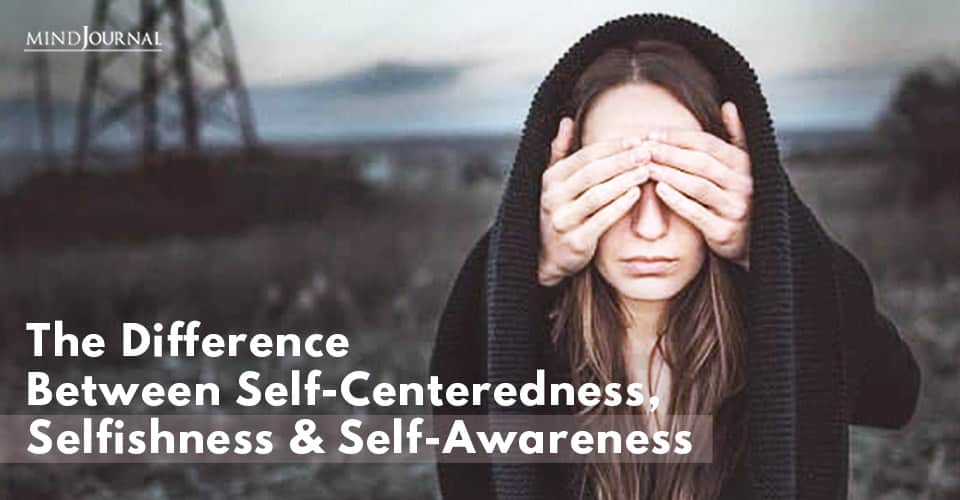Sometimes the line gets blurred when you think about whether there are any differences between being selfish and self-aware.
Do you believe, “If I ask for something I want, I’m being selfish?”
Or does it make sense to you that there’s a huge difference between being selfish, self-centered, and self-aware?
Let’s talk about those differences.
First, let’s take self-centeredness. Here’s an example. A self-centered person might say: ”Oh, I’m so sorry your mom has cancer. That’s horrible. I’m sure you’ll be taking her for treatments, but does that mean that you won’t be able to keep carpooling?“ Or it might sound like this: “Wow, congratulations! I’m so happy you’re going to have a baby. It took me four years and so much money for infertility treatment. I wouldn’t know what it feels like to do it all naturally.”
A self-centered person grabs the focus. And you’re left wondering why you even bothered to talk to them in the first place. Or somehow you absorb a weird kind of shame for sharing as if your struggles or your joys don’t matter.
The difference between being self-centered and being selfish…
Selfishness is putting yourself, your own needs, in front of someone else’s, most or all the time. If there’s pie, a selfish person grabs the last piece. If a child needs to be picked up, they have an appointment they can’t miss, and it’s left up to you.
Sometimes, not being able can’t be helped. But if it happens all the time, then it’s selfishness. And it’s very hard to be in a relationship with someone who knows only how to take but not to give.
Related: 4 Signs You Are In A Selfish Relationship
How is self-awareness different?
Being self-aware is a very different choice. My definition is simple: You keep in mind your own needs or wants, and treat them with as much consideration as you treat the wants and needs of others. Your needs don’t always rise to the top of the needs/wants/time available chart, but they do sometimes, just like sometimes you put the wants and needs of others ahead of yours. But your needs are in consideration enough of the time.
The important word there is “enough.” Sometimes, that’s not a lot, because someone else’s needs to take priority, and for good reason. Either we all get really, really… really busy. Yet there are other times that you find yourself in a more painful or frightening or confusing place and frankly, your needs – and you — need attention and support.
You could call it good self-care. You ask for help, and hopefully, receive it.
Is this confusion a part of perfectly hidden depression?
If you struggle with perfectly hidden depression, may not know the difference between selfishness and self-awareness. You might not have been taught or treated as if your childhood needs and wants were even significant.
So this is what you heard from people who were supposed to be taking care of you.
“Nobody asked you.”
“You shouldn’t be hungry, we just ate.”
“You need to call and tell your friends your birthday party is off. Mommy’s tired.”
This often occurs in families where there’s abuse or neglect, where parents have a rigid, authoritarian style of parenting, or where secret addictions were present.
You were consistently handed out subtle (and not-so-subtle) messages that if you wanted or needed something, it didn’t matter. You learned that your needs came after others and that you needed to stifle your desires and put others first.
And you continue that belief into adulthood.
But the fact is, you’re as important as everyone else.
Three things you can do to try self-awareness on for size…
So what can you do if you struggle with knowing the difference between, self-centeredness, selfishness, and being self-aware?
1) Confront your own “selfish” label.
Ask yourself this: Would you tell someone else that they were being selfish if they took a walk for an hour instead of doing laundry?
No. You wouldn’t. Usually, when you apply to yourself what you would say to someone else, you have to laugh at the irrationality of what you’re thinking.
Related: 3 Things You Need To Start Believing in Yourself
2) Understand that being self-aware can increase the likelihood of vulnerability.
When you turn your attention on yourself, either through calm thought and meditation or through paying attention and even nurturing yourself, pain can emerge. You’re giving yourself the message that you’re important — one that maybe you never received before or didn’t receive appropriately.
You have to be ready for that. You might not be accustomed to feeling vulnerable. Or sad. Or angry.
3) Risk doing something, at least once a week, that’s just for you.
Even if it’s a small thing, like taking 30 minutes to sit down and read, driving out in the country, or calling a friend.
Gifts to yourself don’t have to be big to make a big difference. It may feel awkward at first, but it’s so worth it.
Because you’re worth it.
Check out Dr. Margaret Rutherford’s bestselling book Perfectly Hidden Depression on Amazon. Her book will be translated into seven different languages and will be available this year.
Written by Margaret Rutherford
Originally Appeared In Dr. Margaret Rutherford
Being selfish is different, and being self-aware is entirely different. Just because you are prioritizing yourself for a change, that does not make you selfish or self-centered in any way. In order to achieve true happiness in life, sometimes it is important to put yourself first, and do things that make you happy, and makes your heart sing.










Leave a Reply